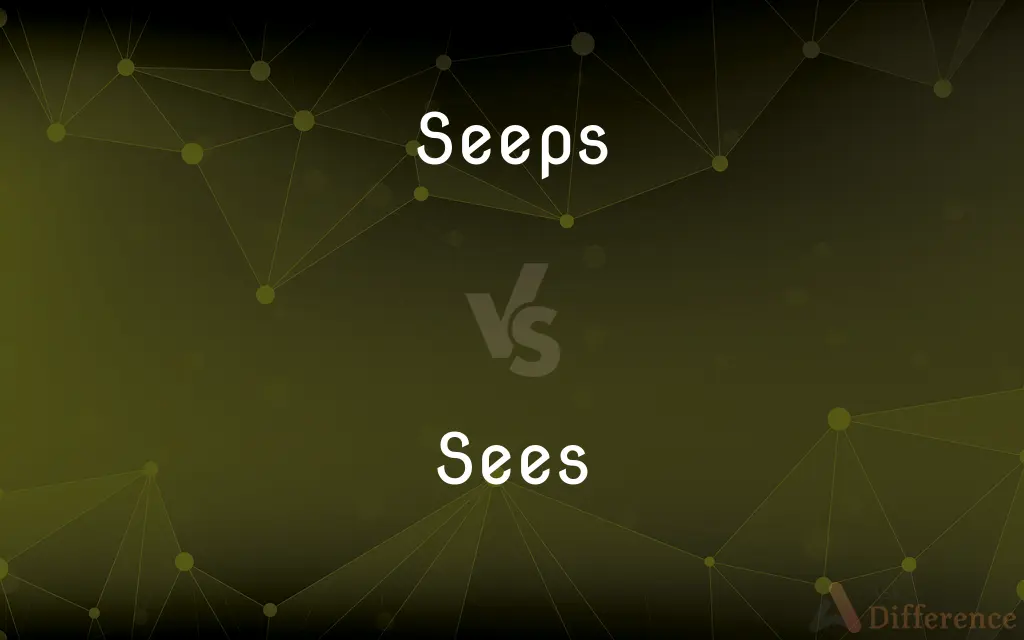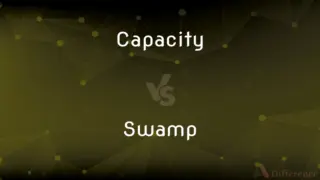Seeps vs. Sees — What's the Difference?
By Fiza Rafique & Maham Liaqat — Updated on April 1, 2024
Seeps refer to the slow passage of a liquid through a porous surface or substance, while sees denotes the act of perceiving with the eyes.

Difference Between Seeps and Sees
Table of Contents
ADVERTISEMENT
Key Differences
Seeps is a verb that describes the process of liquid gradually permeating through something porous, like water seeping through the ground. It emphasizes the slow and often imperceptible movement of fluids. On the other hand, sees is the third-person singular form of the verb "see," which involves the perception of objects using the eyes, highlighting an immediate and direct form of perception.
When discussing environmental processes, seeps can refer to the way groundwater moves through soil layers, essential for understanding aquifers and soil moisture. Whereas, sees is used in contexts that involve visual observation and recognition, such as in scientific research where observing phenomena is crucial for data collection and analysis.
Seeps might be used metaphorically to describe the gradual spread of something, like information or feelings, permeating through a group or an individual's consciousness. In contrast, sees could also have metaphorical uses, such as in phrases like "sees the truth," where it denotes the realization or understanding of a concept, not just visual perception.
The concept of seeps is particularly relevant in studies related to hydrology, environmental science, and geology, focusing on the physical movement of liquids through mediums. Sees, however, spans a wide range of applications from basic visual tasks to complex cognitive processes in psychology and philosophy, involving interpretation and understanding based on visual input.
Both seeps and sees highlight different aspects of interaction with the world: seeps through a physical, often unseen process affecting environments and materials over time, and sees through a sensory experience that forms the basis of immediate knowledge, observation, and interaction with one's surroundings.
ADVERTISEMENT
Comparison Chart
Definition
Slow passage of liquid through a porous surface
Act of perceiving with the eyes
Context
Environmental science, hydrology
Visual perception, observation
Metaphorical Use
Spread of feelings, information
Realization or understanding
Relevance
Geology, environmental studies
Psychology, philosophy, everyday life
Process
Physical, often gradual and imperceptible
Immediate, direct sensory experience
Compare with Definitions
Seeps
Hydrological Process.
Water seeps through the soil, replenishing the aquifer.
Sees
Observation.
He sees the experiment's results, noting the changes.
Seeps
Environmental Concern.
Contaminants seep into the groundwater, posing risks to ecosystems.
Sees
Visual Perception.
She sees the painting and appreciates its beauty.
Seeps
Gradual Movement.
Oil seeps from the underground reservoir through fissures in the rock.
Sees
Understanding.
The scientist sees the pattern in the data, revealing a new theory.
Seeps
Slow Spread.
Rumors seep through the community, affecting perceptions.
Sees
Immediate Recognition.
The child sees the toy and instantly smiles.
Seeps
Imperceptibility.
Moisture seeps into the walls, causing damage over time.
Sees
Cognitive Process.
She sees the solution to the puzzle, solving it quickly.
Seeps
To pass slowly through small openings or pores; ooze
Water is seeping into the basement.
Sees
To perceive with the eye
Do you see the hawk in the tree?.
Seeps
To enter, depart, or become diffused gradually
The importance of the situation finally seeped into my brain. The news seeped out bit by bit.
Sees
To detect by means analogous to use of the eye
The surveillance camera saw the intruders.
Seeps
A place on land or underwater where a liquid or gas oozes out of the ground.
Sees
To attend or view as a spectator
Saw a play.
Seeps
Plural of seep
Sees
To refer to or look at
Persons interested in the book's history should see page one of the preface.
Sees
To become aware of or apprehend
She saw from his expression that he did not want to go.
Sees
To find out or ascertain, often by moving
Please see who's knocking.
Sees
To take note of; recognize
She sees only the good aspects of the organization.
Sees
To consider to be; regard
Many see her as an inspiring figure.
Sees
To have a mental image of; visualize
They could still see their hometown as it once was.
Sees
To foresee or imagine
I see great things for that child.
Sees
To know through firsthand experience; undergo or experience
He saw service in the navy. She has seen many changes in her lifetime.
Sees
To be characterized by; be the time for
"The 1930s saw the development of sulfa drugs and penicillin" (Gregg Easterbrook).
Sees
To be subjected to; undergo
This word sees a lot of use in sports.
Sees
To visit, meet, or be in the company of
I saw all my aunts and uncles at the reunion.
Sees
To share the companionship of as a romantic partner
He's been seeing the same woman for eight years.
Sees
To visit for consultation
You ought to see your doctor more frequently.
Sees
To admit or receive, as for consultation or a social visit
The doctor will see you now.
Sees
To escort; attend
I'm seeing Amy home.
Sees
To make sure; take care
See that it gets done right away.
Sees
To meet (a bet) in card games.
Sees
To meet the bet of (another player).
Sees
To have the power to perceive with the eyes
Once I got glasses I could see much better.
Sees
To have the ability to detect or record visual information
This telescope sees far into space.
Sees
To understand; comprehend
As you can see, life in medieval Europe was difficult.
Sees
To consider
Let's see, which suitcase should we take?.
Sees
To go and look
She had to see for herself and went into the garage.
Sees
To ascertain; find out
We probably can do it, but we'll have to see.
Sees
To have foresight
"No man can see to the end of time" (John F. Kennedy).
Sees
The official seat, center of authority, jurisdiction, or office of a bishop.
Sees
(Obsolete) A cathedra.
Sees
Plural of see
Common Curiosities
How do we use "sees" in a sentence?
"Sees" is used to describe the act of perceiving or noticing something with the eyes, e.g., "He sees the bird fly across the sky."
Can "seeps" only refer to liquids?
While typically referring to liquids, "seeps" can also metaphorically describe any slow, gradual process of movement or spread.
Is "sees" always about literal vision?
No, "sees" can also refer to understanding or recognizing something, not just physical sight.
How do seeps affect the environment?
Seeps can affect the environment by transporting nutrients and pollutants, replenishing groundwater, and supporting specific habitats.
What's the difference between "sees" and "observes"?
"Sees" implies the act of perceiving visually, while "observes" can also mean watching attentively or studying over time, not necessarily limited to visual perception.
What does it mean when water seeps?
Water seeping refers to the slow movement of water through porous materials, like soil or permeable rock.
Can something seep quickly?
Typically, seeping is a slow process, but the rate can vary depending on the permeability of the material it passes through.
Do seeps always lead to damage?
Not always; seeps can be beneficial, like watering plants, but can cause damage in situations like foundation seepage.
How does one improve what one sees?
Improving visual perception can involve enhancing observational skills, practicing mindfulness, or, in a literal sense, using corrective lenses for clearer vision.
How is "sees" used metaphorically?
Metaphorically, "sees" can mean to understand or become aware of something, beyond just visual perception.
Share Your Discovery

Previous Comparison
Doubt vs. Wonder
Next Comparison
Capacity vs. SwampAuthor Spotlight
Written by
Fiza RafiqueFiza Rafique is a skilled content writer at AskDifference.com, where she meticulously refines and enhances written pieces. Drawing from her vast editorial expertise, Fiza ensures clarity, accuracy, and precision in every article. Passionate about language, she continually seeks to elevate the quality of content for readers worldwide.
Co-written by
Maham Liaqat











































